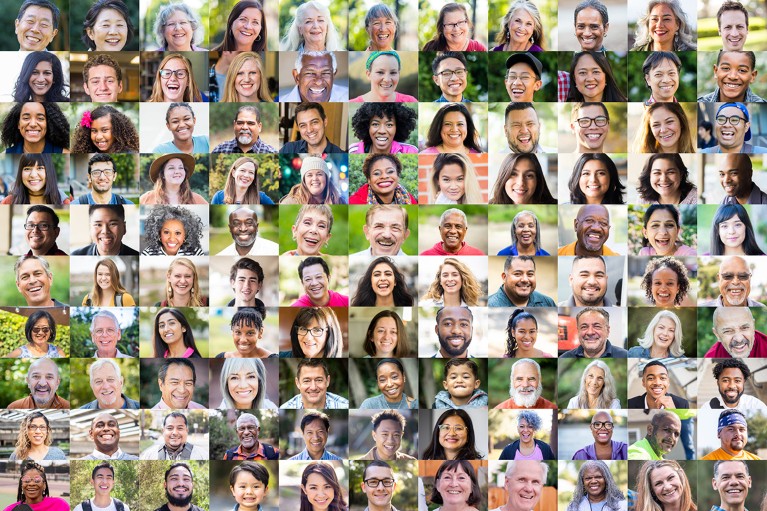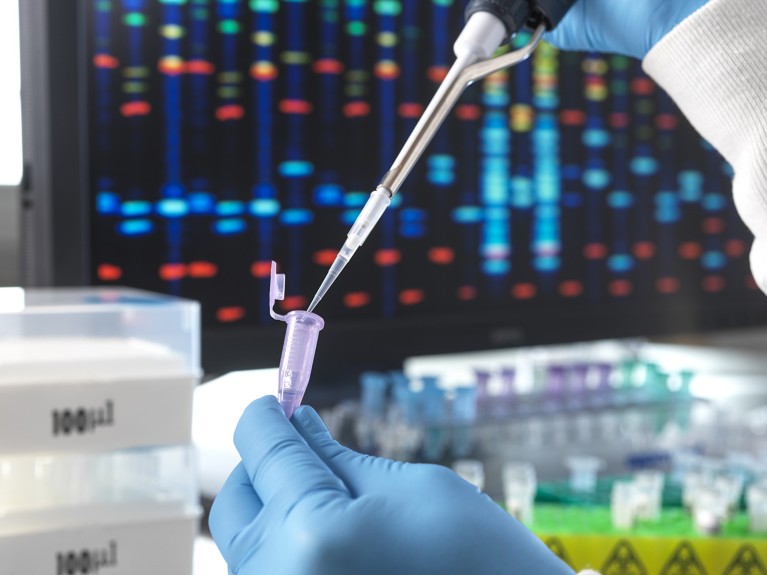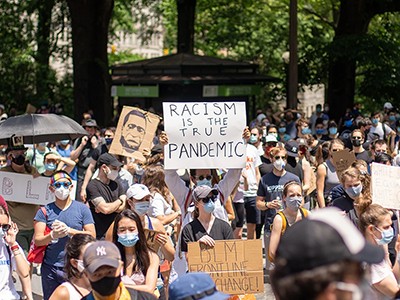
Social constructs of descent-based identity, such as race and ethnicity, do not align with genetic groupings.Credit: Adamkaz/Getty
In 1924, motivated by the rising eugenics movement, the United States passed the Johnson–Reed Act, which limited immigration to stem “a stream of alien blood, with all its inherited misconceptions”. A century later, at a campaign event last October, now US President Donald Trump used similar eugenic language to justify his proposed immigration policies, stating that “we got a lot of bad genes in our country right now”.
If left unchallenged, a rising wave of white nationalism in many parts of the globe could threaten the progress that has been made in science — and broader society — towards a more equitable world1.
As scientists and members of the public, we must push back against this threat — by modifying approaches to genetics education, advocating for science, establishing and leading diverse research teams and ensuring that studies embrace and build on the insights obtained about human variation.
Racist tropes persist
At a hearing in February, the now-confirmed head of the US Department of Health and Human Services, Robert F. Kennedy Jr, reiterated his past comments that Black children should receive different vaccine schedules from white children because of variations in their immune systems.
How white supremacy became a global health problem
Kennedy’s motives in this regard are unclear. But after making numerous demonstrably false statements about vaccination, he is providing another layer of reasoning that the scientist whose work Kennedy cites described as “twisting the data far beyond what they actually demonstrate” while promoting racial essentialism: the false belief that people of different ‘races’ have inherently distinct biology2,3.
Meanwhile, although Trump stated at his inaugural address that his administration “will forge a society that is colorblind and merit-based”, an executive order he signed in March condemns as “corrosive ideology” the Smithsonian Institution’s promotion in its museums and research centres of the view that race is not a biological reality, but a social construct.
Similar rhetoric is increasingly entering political discourse as pro-nativist and anti-immigration parties (at times propped up by scientific racism) gain traction in many parts of the world.
The dangerous and pseudoscientific ideas of eugenics have periodically gained popularity over the past century. But the latest wave of white nationalism is happening after decades of two interlinked concepts gaining attention and acceptance in the scientific community.
On the one hand, there is broad consensus among researchers that social constructs of descent-based identity, such as race and ethnicity, do not align with genetic groupings. On the other, there is growing awareness that diversity matters for sound science and effective policy, including in health care. Embraced together, these two concepts have strengthened science and increased benefits to health.
Race as a social construct
Decades of sociological data demonstrate that racial and ethnic identities, whether self-identified or otherwise, are constructs that are defined and deployed in specific sociopolitical contexts.
Take the degree to which racial and ethnic categories have been altered over the past two and a half centuries in the US Census, in response to political needs and social changes. The term Hispanic, which is now used to refer to people with heritage from Spanish-speaking countries, was first brought in for the 1970 census, in response to lobbying from Latino advocacy groups. In reaction to changing societal norms, the term African American was added to the 2000 census as an alternative to ‘Black’ and ‘Negro’ (with the latter being dropped in 2013, in time for the 2020 census).

Researchers and health-care providers are moving away from ‘race-based medicine’.Credit: Getty
Alongside analyses of sociological data, genetic research has repeatedly demonstrated that constructs of descent-based identity, such as race and ethnicity, do not align with discrete biological groupings. It has also shown that their use can exclude those who do not fit into a specific category and obscure substructure in populations, with implications for human health.
For example, the likelihood of people having haemoglobinopathies (inherited disorders that affect red blood cells) varies substantially depending on where in the world a person lives. In some regions of India, carrier rates for the blood disorder β-thalassaemia are estimated to be higher than 8%, whereas in areas of China, they can be as low as 2.7%4. This heterogeneity would be missed if researchers simply grouped study participants as ‘Asian’, a term that refers to nearly 60% of the global population. Similarly, using the category ‘Hispanic’ without considering other factors would fail to reveal that the genetic variant associated with Steel syndrome, a rare genetic bone disorder, is more common in people from Puerto Rico than in those from the Dominican Republic or Mexico5.
Many now question the use of race as an appropriate proxy for anything, from hypothesized biological differences to environmental influences. In fact, researchers and health-care providers have been moving away from ‘race-based medicine’, in which perceived biological differences change the estimation of clinical risk and the provision of patient care on the basis of whether people are Black, white, Asian, Hispanic and so on6,7.
Counter the weaponization of genetics research by extremists
In conjunction with the growing acceptance of the idea that social identities related to ancestry don’t align with genetic groupings, multiple studies conducted over the past decade have demonstrated the benefits of including diverse participants in research.
Any two human genomes are, on average, more than 99% identical. Yet millions of variants across people’s genomes — including ones that are relevant for health — differ in frequency to varying degrees as a result of demographic processes (both random and non-random) playing out over centuries to millennia. Increasing the diversity of participants in studies increases geneticists’ chances of finding variants that are important to health, and lessens their likelihood of drawing spurious conclusions about the genetic or other factors driving disease8,9.
The availability of large-scale multimodal data and advanced statistical and computational tools is making it easier than ever for researchers to stop relying on race or ethnicity as proxies for biology or structural and social determinants of health. Instead, they can interrogate the effects of many well-defined variables, from people’s genetics and geographical location to their diet and income.
Over the past few years, multidisciplinary frameworks have been developed to inform researchers — and so aid study design and the appropriate interpretation of findings. Reports from the US National Academies of Science, Engineering, and Medicine, for instance, emphasize the need for more-diverse groups of participants to be included in genetics and genomics research2, as well as in biomedical research more broadly3. They also stress the importance of a diverse workforce — which has consistently been shown to result in higher productivity, as well as in work that has a greater impact on people’s lives10,11.






